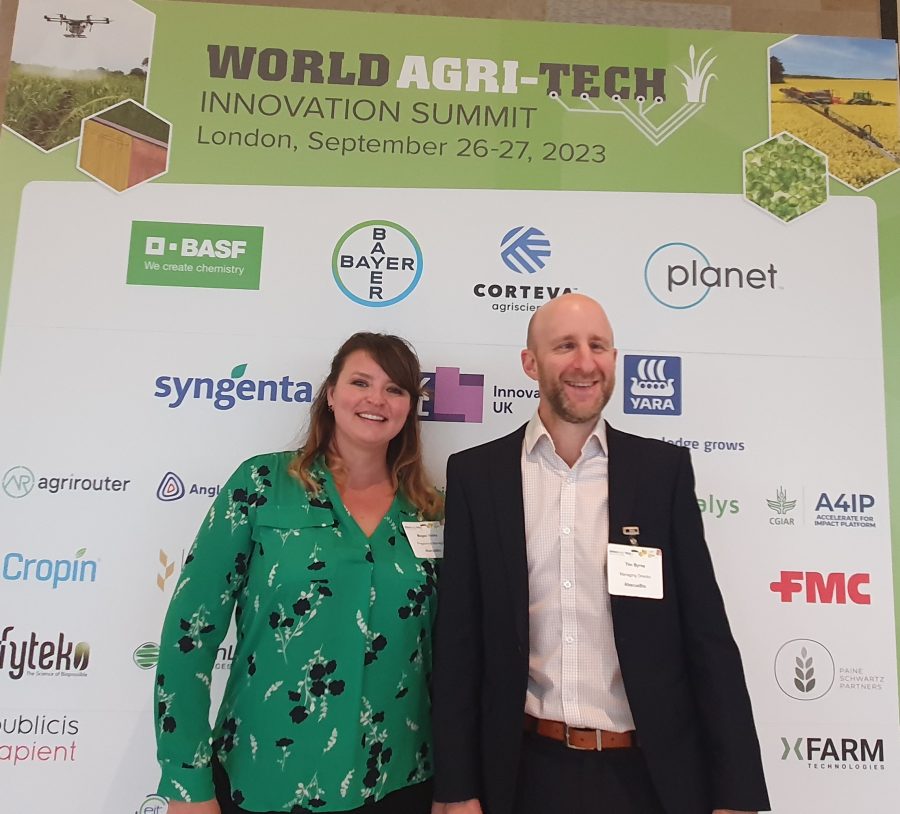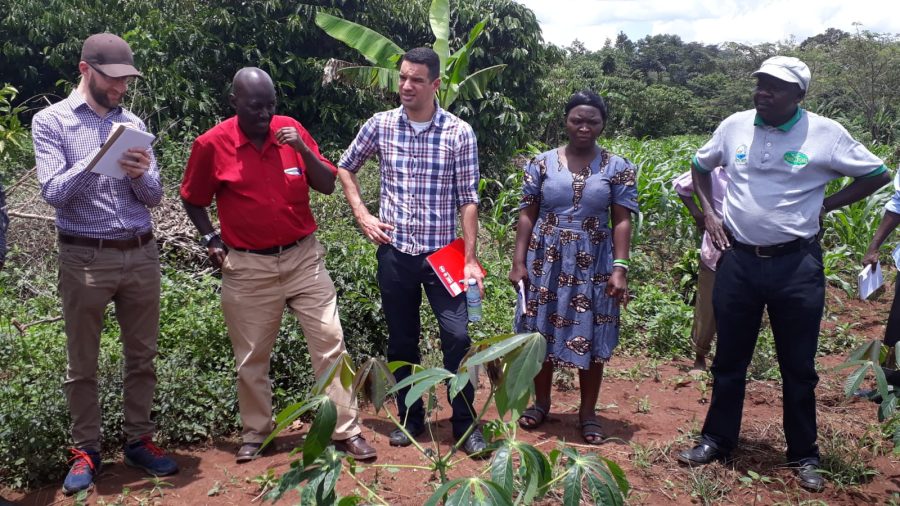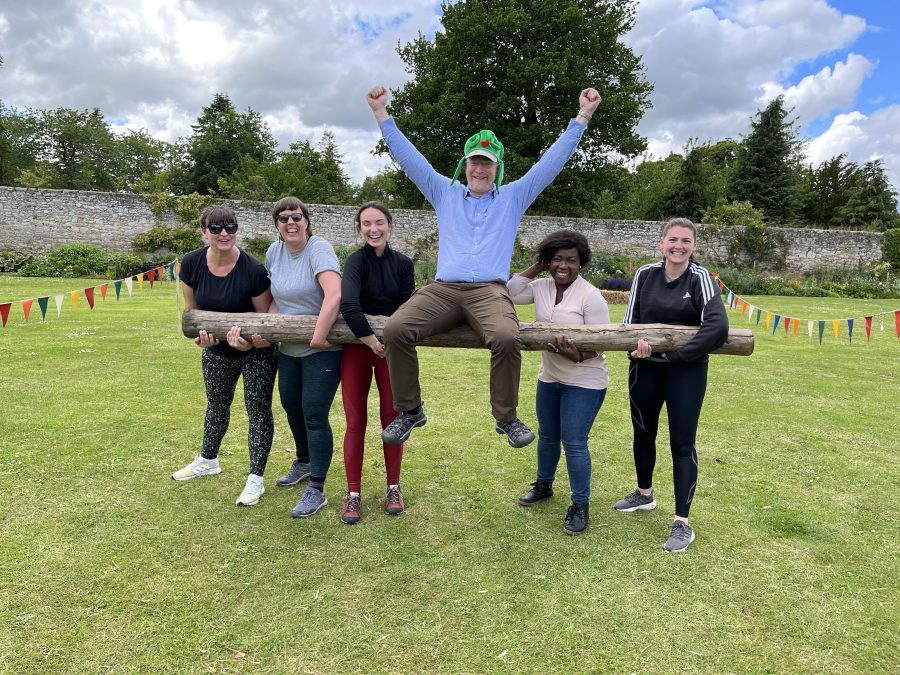While in London attending the World Agritech Summit, AgriTechNZ’s Kylie Horomia had a chance to catch up with Tim Byrne (Regional Managing Director – UK) and Megan Vasko (Programme Manager) from AbacusBio to find out more about this Member and what they’re doing in the world of plant and animal genetics.

AbacusBio has been around for over 20 years and was born in Dunedin, New Zealand. Since then, they have grown and established offices in both the United Kingdom (2017) and more recently in Edmonton, Canada. They are experts in plant and animal genetics with a focus on breeding programme design and improvement.
For those not versed in the science and technology of genetics and breeding (myself included), it’s a key aspect of ensuring food security and biodiversity.
If you consider the thousands of mammal and bird species on the planet, research shows that only 40 species are domestic and play an important role in meat, dairy and egg production. However, a 2023 report from the FAO notes “26 percent of the breeds for livestock production are endangered species, and 6 percent are already extinct.”
“Adaptation strategies focused on animal genetic resources can influence a population through selective breeding of more resilient breeds or crossbreeding of high-temperature or disease-resistant breeds; or switching to other species when the above measures can no longer be applied.”
Which brings us back to AbacusBio. The work they are doing is playing a positive role in the future of food production and their work on the global stage is worth recognising.
The FAO (Food and Agriculture Organization of the United Nations) note that sustainable food systems need to recognize the role of biodiversity i.e., the genetic diversity present in the production and systems surrounding them.
A 2019 report called The State of the World’s Biodiversity for Food and Agriculture showed that “many of the key components of biodiversity for food and agriculture at the genetic, species and ecosystem levels are declining. The factors behind this decline include climate change, overexploitation of crops and changes in land use, as well as demographic developments and market preferences.”

What has been a highlight in the AbacusBio journey?
TIM: The impact and ability to do things that are meaningful for our clients and for farmers. Also, where we’ve been able to positively impact the livelihoods of small-scale producers.
For example, in 2020 we began a project in Uganda which was part funded by the UK Government and focused on digitalisation and improvement tools for small scale pig producers. We provided a data platform and analytics service for a pig, animal health and artificial insemination company.
That led to our partnership with PIC, a global pig breeding company that supplies improved genetics into Uganda. This means small producers get a better service, better genetics, and better productivity, which improves their livelihoods. It’s becoming a commercial success for all parties involved and added more value to the small-scale production systems.
What are some learnings from your experience moving into a new market with a new product?
TIM: Having on the ground experience and diversity of thought and approach is important. This is particularly true in a developing country context, but the need for open-mindedness applies in all operating contexts. Getting close to really understand what the problem is, and then deciding a solution that is fit for purpose.
One good learning for us was that not all technology fits all situations. We’ve had to work hard to ensure that what we do is applicable to the clients’ problems.
Have there been times where it didn’t go well?
TIM: We had instances where we started doing something for a client and it didn’t initially turn out the way that either of us thought.
MEGAN: But we pride ourselves on owning the problem if it’s ours. The key is radical transparency. We don’t hide anything from them, and we make sure that information is a constant feedback loop. It makes the conversations you may need to have downstream easier because there are no real surprises.
What’s the technology journey been like?
TIM: The technology we use is usually reasonably mature. Genetic improvement technology that’s been developed over lots of years through all sorts of R&D activity. We’re not at the cutting edge of research and development. We’re at the intersection between the science idea and getting it to work in a commercial situation.. It’s about getting technology to work in a bunch of different environments with a bunch of different challenges, amid the realities of a commercial business. Things don’t always look like they might in a research environment.
It’s getting things to work in a commercial setting where the science needs to be used so growers or farmers can get some success from it.
MEGAN: It’s like you have a mould for a solution and you need to find all the pieces to put in there to make it work. And sometimes those pieces have wonky edges and they’re not the same pieces each time you do it.
Do you have partnerships or collaborations?
MEGAN: I think you could argue that anyone that is a client is a collaborator with us. More often than not it’s scientists working together with other scientists to solve the problems the client has.
What’s next for AbacusBio?
TIM: We’ve just opened an office in Canada so have a focus to make that successful throughout North America.
The business grew out of skill sets in animal breeding, more recently we’ve shifted into plant breeding programmes. It’s part of our strategy to grow in the plant breeding space. And also, sustainability is in our strategy. We want to be more sustainable as a business and make sure we can quantify the things we’re doing for the sustainability of our clients.
Any final thoughts for anyone starting out?
TIM: If you’re entering a new market, leverage all the help you can get. If you get an opportunity to work with New Zealand Trade & Enterprise or other government organisations or other companies that have been on that journey, then take those meetings because there’s small things that you might learn that can make a big difference when it comes to operational efficiency and getting started, hiring, finding clients and all the things that make a business work.
MEGAN: As a non-Kiwi I would say, don’t let the tall poppy syndrome stop you. Fortune favours the bold and you need to shout and be really proud about what you’re doing. Other people are going to value you as much as you value yourself. So don’t be shy about it.
To fully understand the work AbacusBio is doing have a look at the projects listed on their website which includes rice improvement in Tanzania, Irish cattle breeding to reduce GHG emissions, genetics with Beef + Lamb New Zealand, impact assessment for disease interventions for the University of Edinburgh, , and food security initiatives in sub-Saharan Africa and India, and many other projects.
You can view them on their website here – https://abacusbio.com/project/
